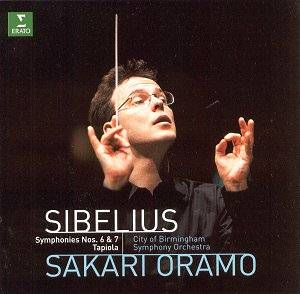Oramo has been forging a dazzling reputation
for himself and for Birmingham since his appointment as Music
Director there five years ago. His programming and his interpretations
display an adrenaline factor sadly absent from the Hallé's
current seasons, beginning to leach away from the RLPO, and only
sustained with equal valour and exuberance by the BBC Philharmonic
in Manchester. The London orchestras have shown little of these
qualities. I think we will look back on these days as a golden
era comparable with Rozhdestvensky's time with the BBCSO in the
early eighties and Järvi's in the late eighties and early
nineties with the RSNO. As one example of his approach to repertoire,
the coming season includes three major works by John Foulds (surely
confirmation of the rumours that there will be a complete CD of
this visionary music). In one of those early seasons he conducted
Constant Lambert's large-scale choral/orchestral classic, Summer's
Last Will and Testament. This happened at a time when seemingly
no-one else had the percipience or determination to tackle the
work ... not since isolated performances by Norman del Mar and
Vernon Handley during the 1980s.
The world seems to be awash with Sibelius cycles
many of which I have been able to review here. Vänskä
(Bis), Ashkenazy (Decca), Berglund (Bournemouth, EMI) and Karajan/Kamu
(DG Trio), to take three examples, are all recommendable.
Many of the others have individual performances that are outstanding
but are less successful across the board - Barbirolli (EMI), Maazel/Pittsburgh,
Sakari (Naxos) and Abravanel (Vanguard).
I have not heard Ehrling, Berglund (Chamber Orchestra
of Europe - better than promising if the extracts on a recent
Finlandia compilation are anything to go by), Rattle (CBSO again),
Leaper, Saraste, Segerstam, Gibson or Watanabe so I cannot yet
give a comprehensive comparative overview. I do however know that
Oramo's recording of the Sixth stands at the extremes of interpretation
and will remorselessly hold your attention. I always think of
the Sixth in terms of a certain bleached radiance. The exemplar
of this trend is Karajan's DG Sixth. The work has also come to
be thought of as slowly blooming with Bernstein's CBS/Sony recording
being the best illustration of that tendency. Oramo has none of
this. The symphony is over in just over 27 minutes. It is driven,
heated, impetuous, goaded forward and passionate in a way I do
not recall hearing before. Oramo might almost be another Mravinsky
in the belligerent impetus with which he infuses and sets fire
to Sibelius's pages. The fourth movement catches the rolling stormy
magic of the piece and links, in a way I have never previously
remarked, to the Seventh Symphony. It works extremely well. Any
Sibelian must hear this version.
I mentioned Mravinsky earlier; how tragic that
he never recorded any other Sibelius apart from the Seventh and
Tuonela. Oramo does not achieve and probably never set
out to achieve the brazen indomitableness of Mravinsky's Seventh
(BMG-Melodiya, Moscow, 1965). However he too makes his mark with
an interpretation that is intense, laden with sustained valedictory
sentiment and epic in reach. It does not for me supplant Ormandy
(Sony) or Mravinsky (BMG-Melodiya) but it is a fine reading.
The Seventh has its driven impetuous moments
where you are conscious of an urgency to move forward but this
is as nothing to Oramo's way with Tapiola. The opening
pages are soaked with accelerant and goaded forward in a way you
may find startling. You might think such 'impatience' would damage
the music. Not at all. This is the equivalent of the 1943 Berlin
Furtwängler version of a much earlier Sibelius tone poem,
En Saga.
I understand that there is a complete box of
the Oramo/CBSO Erato symphonies. I hope to be able to review that
here but should you wish to press ahead here are the full details:-
Symphonies 1, 3, Finlandia 0927 43500-2
Symphonies 2, 4 0927 85776-2
Symphony 5, Karelia, Pohjola's Daughter,
The Bard 0927 85822-2
Symphonies 6, 7, Tapiola 0927 49144-2
Complete Set 2564 60294-2 (4CD set)
If you like your Sibelius served ablaze rather
than cool then Oramo is certainly the man for you. If Mravinsky
is your idol in the Tchaikovsky Fourth, Ormandy in Harris 7, Bernstein
in Randall Thompson 2, Gerhardt in Hanson 2, Kondrashin in Rachmaninov's
Symphonic Dances, Svetlanov in Manfred or Beecham
in Sibelius 2 then you are likely to be adding this Erato disc
to your hall of fame. Magnificent.
Rob Barnett
